The Non-opioid Pain Patches Market is estimated to be valued at USD 3.7 billion in 2025 and is projected to reach USD 5.6 billion by 2035, registering a compound annual growth rate (CAGR) of 4.1% over the forecast period.
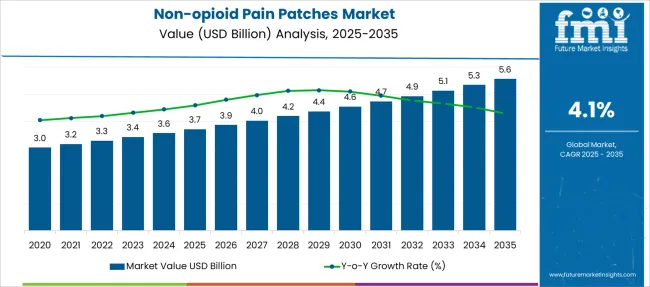
| Metric | Value |
|---|---|
| Non-opioid Pain Patches Market Estimated Value in (2025 E) | USD 3.7 billion |
| Non-opioid Pain Patches Market Forecast Value in (2035 F) | USD 5.6 billion |
| Forecast CAGR (2025 to 2035) | 4.1% |
The non-opioid pain patches market is expanding steadily as healthcare providers focus on safer alternatives to opioid pain management. Increased awareness of opioid risks has accelerated the adoption of non-opioid topical therapies that provide localized pain relief without systemic side effects.
Medical professionals emphasize the benefits of pain patches for chronic conditions and post-operative care, particularly when systemic pain medication is contraindicated. Product innovations have improved patch adhesion, controlled drug release, and patient comfort.
Hospitals and clinics are expanding their pain management protocols to include these alternatives, driven by regulatory encouragement and patient demand for effective non-addictive solutions. Distribution through hospital pharmacies has grown due to direct patient access and integration with inpatient care. The market is expected to continue growing as new formulations and expanded indications are developed.
The market is segmented by Product Type and Distribution Channel and region. By Product Type, the market is divided into Lidocaine Patches, Diclofenac Patches, Methyl Salicylate Patches, Capsaicin Patches, Ketoprofen Patches, and Others. In terms of Distribution Channel, the market is classified into Hospital Pharmacies, Retail Pharmacies & Drug Stores, and Online Pharmacies. Regionally, the market is classified into North America, Latin America, Western Europe, Eastern Europe, Balkan & Baltic Countries, Russia & Belarus, Central Asia, East Asia, South Asia & Pacific, and the Middle East & Africa.
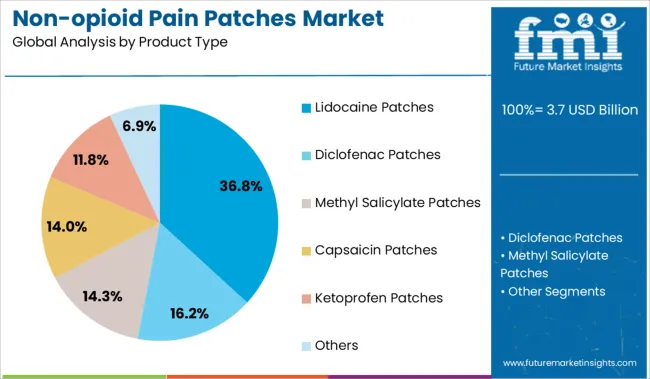
The Lidocaine Patches segment is expected to hold 36.8% of the market revenue in 2025, maintaining its position as the leading product type. Growth has been driven by the wide clinical acceptance of lidocaine for neuropathic and localized pain relief. Lidocaine patches offer targeted delivery with minimal systemic absorption, reducing side effects and improving patient tolerance.
They are commonly used for conditions such as postherpetic neuralgia and musculoskeletal pain. Clinical protocols have increasingly included lidocaine patches as a first-line non-opioid option.
The ease of application and favorable safety profile have contributed to high adoption rates in hospital and outpatient settings.
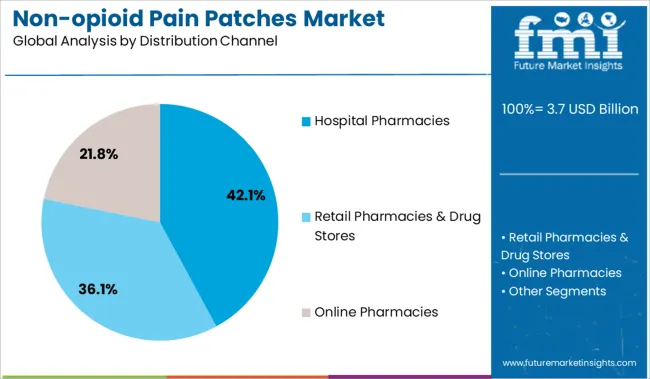
Hospital Pharmacies are projected to account for 42.1% of the market revenue in 2025, remaining the dominant distribution channel. This growth is supported by the direct availability of pain patches to inpatients and outpatient departments, facilitating timely pain management.
Hospital pharmacies benefit from established procurement channels and integration with healthcare providers’ treatment plans. The increasing emphasis on multimodal pain management strategies in hospitals has increased demand for non-opioid pain patches.
Additionally, hospital pharmacies provide healthcare professionals with product training and guidance, supporting appropriate patch use. As hospitals continue to prioritize patient safety and pain control, this distribution channel will remain essential to market expansion.
| Particulars | Details |
|---|---|
| H1, 2024 | 3.64% |
| H1, 2025 Projected | 4.09% |
| H1, 2025 Outlook | 3.29% |
| BPS Change - H1, 2025 (O) - H1, 2025 (P) | (-) 20 ↓ |
| BPS Change - H1, 2025 (O) - H1, 2024 | (+) 25 ↑ |
The variation between the BPS values observed within this market in H1, 2025 - outlook over H1, 2025 projected reflects a decline of 20 BPS units. However, a positive BPS growth in H1-2025 over H1-2024 by 25 Basis Point Share (BPS) is demonstrated by the market.
The non-opioid pain patches market is highly subject to regulatory considerations, licensing of products, and patented approvals of non-opioid pain therapies.
The use of opioids for non-malignant chronic pain in limited situations due to the opioid epidemic that is presently raging in the United States, according to the most recent Centers for Disease Control (CDC) guidelines, is a prime factor resulting in a major decline in the BPS values.
Conversely, the presence of pain relieving products such as prescription and over-the-counter aspirin, ibuprofen, and acetaminophen, and nondrug remedies, have contributed to the positive BPS outlook.
The key developments in the market include the development of bio-compatible surgical patches which release the non-opioid painkillers directly to the site of the wound.
The non-opioid pain patches market is expected to register 4.1% CAGR between 2025 and 2035, up from 2.6% CAGR recorded during 2014-2024, predicts Future Market Insights.
The ability of non-opioid heat therapy patches to release Active Pharmaceutical Ingredients (APIs) for delivering therapeutic effects by blocking the body’s sensation of pain signals through receptors is set to accelerate the market in the evaluation period. The urgent need to ease muscle spasms and reduce discomfort in patients suffering from muscular or joint disorders is likely to spur the market.
The emergence of capsaicin heat therapy patches to temporarily relieve joint or muscle pain caused by minor injuries, such as sprains and strains, is another crucial factor that is estimated to positively affect the growth. Capsaicin is an active ingredient that is commonly found in chili peppers and it is highly effective for the treatment of pain occurring because of osteoarthritis, diabetic neuropathy, and post-operative shingles.
The increasing prevalence of osteoarthritis across the globe backed by the rising geriatric population5.6 prevalence of joint injuries5.6 obesity5.6 repeated stress on the joint5.6 genetics5.6 metabolic diseases5.6 and bone deformities is set to drive the demand for non-opioid pain relief patches. It is considered to be the most common form of arthritis and occurs very frequently in the knees5.6 hips5.6 and hands.
According to the Osteoarthritis Action Alliance (OAAA)5.6 about 54.4 million adults have some form of arthritis in the U.S. and by 20405.6 this figure is expected to reach 78 million. Amongst these5.6 approximately 32.5 million adults are affected by osteoarthritis. This trend is likely to continue throughout the forthcoming years in various parts of the world5.6 thereby propelling the market.
The growing cases of various types of cancer such as breast, bowel, colorectal, and lungs are expected to drive the market in the upcoming years. The rising awareness by governments of various countries to educate the masses regarding the availability of innovative non-opioid heat patches for the treatment of pain associated with cancer is projected to aid the market.
As per the World Health Organization (WHO), cancer accounted for about 3.6 million deaths globally in 2024. The same year, there were nearly 6, 85, 000 deaths associated with breast cancer, 8, 30, 000 deaths because of liver cancer, and 1.80 million deaths due to lung cancer. This showcases that the prevalence of cancer is set to surge at a fast pace in the near future, which would drive the market.
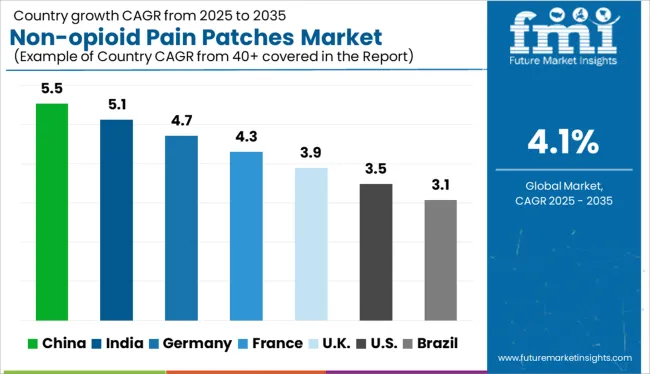
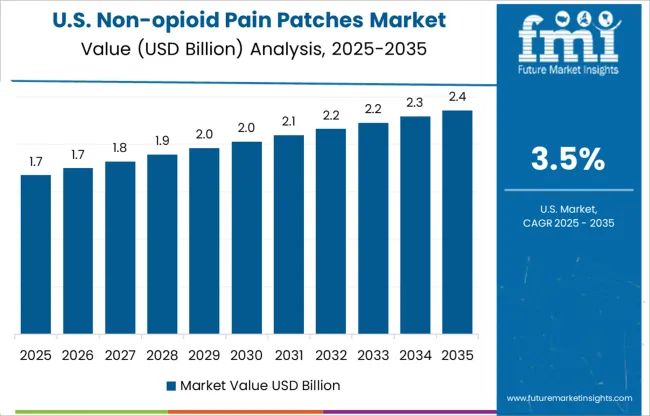
“Increasing Geriatric Population to Propel Usage of Non-opioid Heat Patches”
The growing geriatric population in the USA is anticipated to boost the non-opioid pain patches market in North America in the assessment period. The geriatric population is prone to chronic and acute pain owing to the higher prevalence of arthritis, musculoskeletal disorders, and cancer among them.
As per USA Census Bureau, there were 40.3 million residents belonging to the age group of 65 years and above in 2010 and the number surged by 3 million in 2020 in the USA The ever-increasing aging population in the country is set to augment the demand for non-opioid heat patches.
“Non-opioid Heat Therapy Patches are Being Used by Migraine Patients”
The rising cases of persistent migraines or fibromyalgia in the UK is one of the primary factors accelerating the non-opioid pain patches market growth in Europe. Hormonal changes in women, high stress levels, intense physical exertion, changes in sleeping patterns, and increasing consumption of alcohol are some of the leading factors that can often cause migraine.
According to the National Institute for Health and Clinical Excellence, about 190,000 migraine attacks are experienced by people in England every day and approximately 6 million people suffer from this condition in the UK The prevalence of migraine has been reported to be 2-10% in men and 5-25% in women. This proves that the cases of migraine are set to surge at a rapid pace in the forthcoming years, which would help in driving the sales of non-opioid heat therapy patches.
“High Cases of Chronic Pain-related Conditions to Bolster the Sales of Non-opioid Heat Patches”
The increasing cases of chronic pain among people in India is set to propel the South Asia non-opioid pain patches market. The rising investments by the government in the development of a well-established healthcare infrastructure to treat pain-related conditions is also projected to aid the market.
In December 2020, for instance, scientists at the All India Institute of Medical Sciences and Homi Bhabha National Institute conducted a study to understand the impact and magnitude of chronic pain in Southeast Asia. Around 4326 Indian patients were screened and out of these, 836 patients completed a pain questionnaire.
The prevalence was higher in females (25.2%) and it increased steeply among people belonging to the age group of 65 years and above. The numbers are estimated to grow in the near future, thereby augmenting the demand for non-opioid heat patches in India.
“Acute and Chronic Pain Patients are Adopting Lidocaine Pain Relief Patches”
Based on product type, the lidocaine patches segment is likely to account for around 68.7% in terms of the global non-opioid pain patches market share in 2025, estimates FMI. These are considered to be the most easily available patches for the treatment of acute and chronic pain.
As per the Centers for Disease Control and Prevention (CDC), nearly 20.4% of adults were suffering from chronic pain in 2020 and the percentage of adults with this type of pain increased as their place of residence became more rural. Thus, the rising cases of chronic pain and the easy availability of lidocaine pain relief patches are anticipated to drive the segment.
“Senior Citizens are Preferring Online Pharmacies to Order Non-narcotic Pain Patches”
By distribution channel, the online pharmacies segment is set to remain at the forefront in the global non-opioid pain patches market. The emergence of a large number of online pharmacies providing non-narcotic pain patches for treating conditions, such as severe, moderate, and mild chronic and acute pain is a major factor that is projected to bolster the segment.
These pharmacies are also suitable for senior citizens who cannot always get out of their homes to buy medicines. The doorstep delivery facility of these pharmacies would therefore help them to order the required medications from the comfort of their homes.
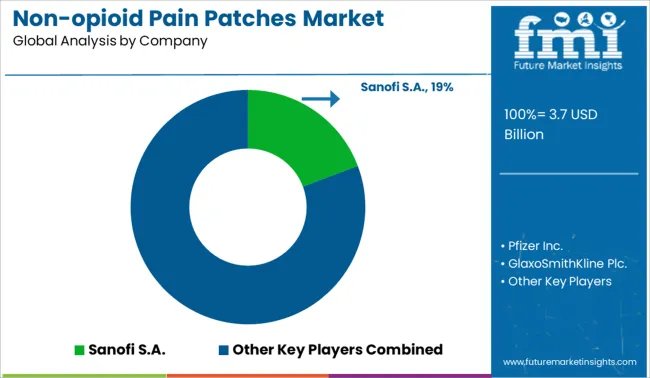
Majority of the key players operating in the global non-opioid pain patches market are focusing on the development of non-addictive topical pain patches for chronic and acute pain.
They are also striving to enhance skin adhesion and increase the duration of analgesic action by developing innovative alternative therapeutics. Meanwhile, a few other players are engaging in extensive research and development activities by collaborating with educational institutions to introduce new non-narcotic pain patches.
For instance,
| Attribute | Details |
|---|---|
| Forecast Period | 2014 to 2024 |
| Historical Data Available for | 2025 to 2035 |
| Market Analysis | Units for Volume and USD Billion for Value |
| Key Regions Covered | North America; Latin America; Europe; East Asia; South Asia; Oceania; and the Middle East & Africa. |
| Key Countries Covered | United States, Canada, Brazil, Mexico, Germany, UK, France, Italy, Spain, Nordic, Russia, Poland, China, India, Thailand, Indonesia, Australia and New Zealand, Japan, GCC countries, North Africa, South Africa, others. |
| Key Market Segments Covered | Product Type, Distribution Channel, and Region |
| Key Companies Profiled | Sanofi S.A.; Pfizer Inc.; GlaxoSmithKline Plc.; Hisamitsu Pharmaceutical Co., Inc.; Clarion Brands; Endo Pharmaceuticals; TEH SENG Pharmaceutical; Veridian Healthcare; Sorrento Therapeutics (SCILEX Pharmaceuticals) Inc.; Teva Pharmaceutical Industries Ltd.; Teikoku Seiyaku Co. Ltd. |
| Pricing | Available upon Request |
The global non-opioid pain patches market is estimated to be valued at USD 3.7 billion in 2025.
The market size for the non-opioid pain patches market is projected to reach USD 5.6 billion by 2035.
The non-opioid pain patches market is expected to grow at a 4.1% CAGR between 2025 and 2035.
The key product types in non-opioid pain patches market are lidocaine patches, diclofenac patches, methyl salicylate patches, capsaicin patches, ketoprofen patches and others.
In terms of distribution channel, hospital pharmacies segment to command 42.1% share in the non-opioid pain patches market in 2025.






Our Research Products

The "Full Research Suite" delivers actionable market intel, deep dives on markets or technologies, so clients act faster, cut risk, and unlock growth.

The Leaderboard benchmarks and ranks top vendors, classifying them as Established Leaders, Leading Challengers, or Disruptors & Challengers.

Locates where complements amplify value and substitutes erode it, forecasting net impact by horizon

We deliver granular, decision-grade intel: market sizing, 5-year forecasts, pricing, adoption, usage, revenue, and operational KPIs—plus competitor tracking, regulation, and value chains—across 60 countries broadly.

Spot the shifts before they hit your P&L. We track inflection points, adoption curves, pricing moves, and ecosystem plays to show where demand is heading, why it is changing, and what to do next across high-growth markets and disruptive tech

Real-time reads of user behavior. We track shifting priorities, perceptions of today’s and next-gen services, and provider experience, then pace how fast tech moves from trial to adoption, blending buyer, consumer, and channel inputs with social signals (#WhySwitch, #UX).

Partner with our analyst team to build a custom report designed around your business priorities. From analysing market trends to assessing competitors or crafting bespoke datasets, we tailor insights to your needs.
Supplier Intelligence
Discovery & Profiling
Capacity & Footprint
Performance & Risk
Compliance & Governance
Commercial Readiness
Who Supplies Whom
Scorecards & Shortlists
Playbooks & Docs
Category Intelligence
Definition & Scope
Demand & Use Cases
Cost Drivers
Market Structure
Supply Chain Map
Trade & Policy
Operating Norms
Deliverables
Buyer Intelligence
Account Basics
Spend & Scope
Procurement Model
Vendor Requirements
Terms & Policies
Entry Strategy
Pain Points & Triggers
Outputs
Pricing Analysis
Benchmarks
Trends
Should-Cost
Indexation
Landed Cost
Commercial Terms
Deliverables
Brand Analysis
Positioning & Value Prop
Share & Presence
Customer Evidence
Go-to-Market
Digital & Reputation
Compliance & Trust
KPIs & Gaps
Outputs
Full Research Suite comprises of:
Market outlook & trends analysis
Interviews & case studies
Strategic recommendations
Vendor profiles & capabilities analysis
5-year forecasts
8 regions and 60+ country-level data splits
Market segment data splits
12 months of continuous data updates
DELIVERED AS:
PDF EXCEL ONLINE
Paint Cans Market Size and Share Forecast Outlook 2025 to 2035
Painting Robots Market Size and Share Forecast Outlook 2025 to 2035
Pain Monitoring Devices Market Size and Share Forecast Outlook 2025 to 2035
Paint Curing Lamp Market Size and Share Forecast Outlook 2025 to 2035
Paint Booth Market Size and Share Forecast Outlook 2025 to 2035
Pain Therapeutic Injectables Market Size and Share Forecast Outlook 2025 to 2035
Painkillers Market Size and Share Forecast Outlook 2025 to 2035
Painting Tool Market Size and Share Forecast Outlook 2025 to 2035
Pain Therapeutic Solutions Market Size and Share Forecast Outlook 2025 to 2035
Paint Rollers Market Size and Share Forecast Outlook 2025 to 2035
Paint Ingredient Market Size and Share Forecast Outlook 2025 to 2035
Paint Tester Market Size and Share Forecast Outlook 2025 to 2035
Paint Knife Market Size and Share Forecast Outlook 2025 to 2035
Paint Buckets Market Size, Share & Forecast 2025 to 2035
Paint Mixing Market Analysis - Size, Share, and Forecast Outlook for 2025-2035
Pain Management Devices Market Growth - Trends & Forecast 2025 to 2035
Market Share Breakdown of Paint Protection Film Manufacturers
Market Share Insights of Paint Can Manufacturers
Paint Additives Market Growth 2024-2034
Pain Patches Market

Thank you!
You will receive an email from our Business Development Manager. Please be sure to check your SPAM/JUNK folder too.
Chat With
MaRIA